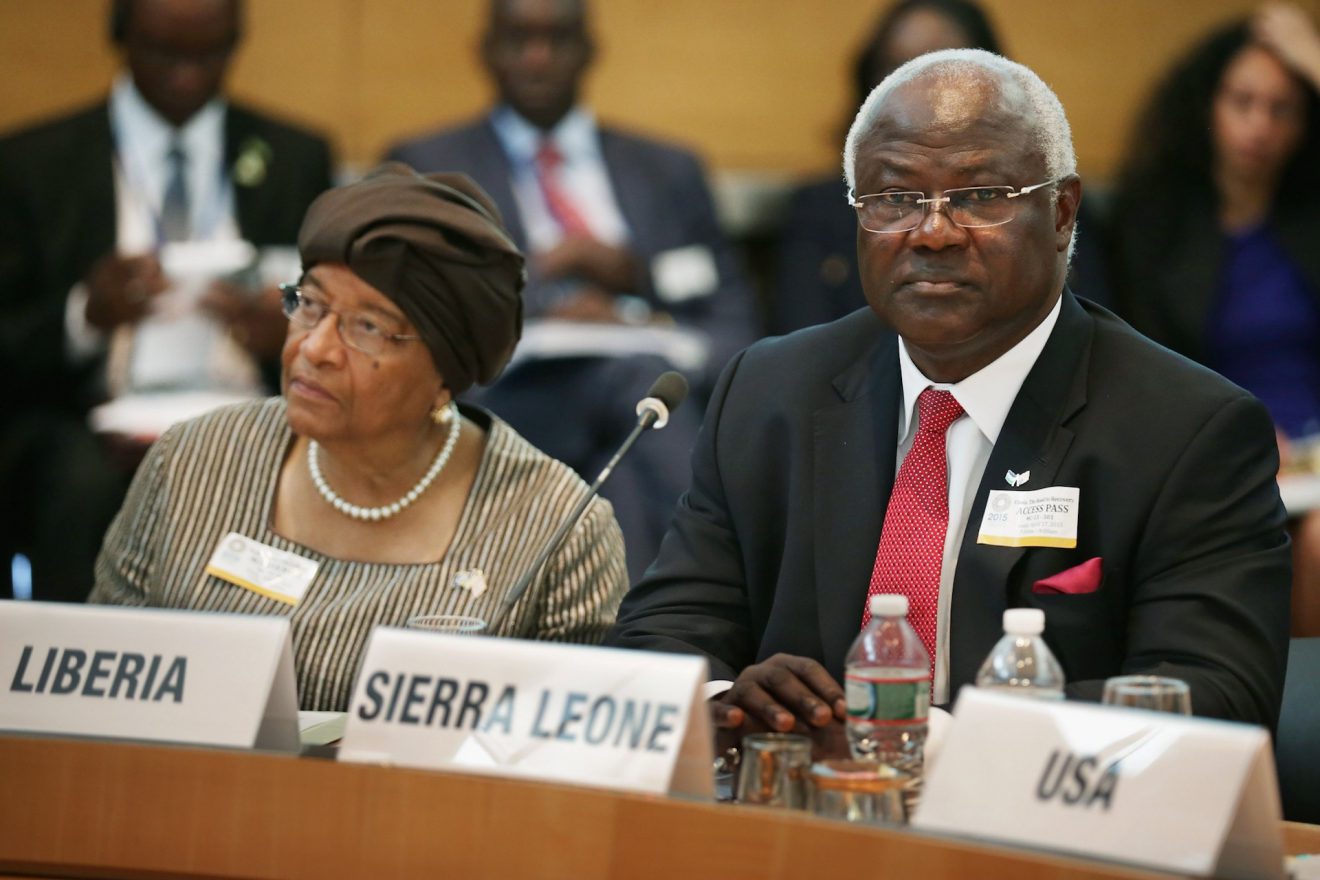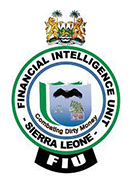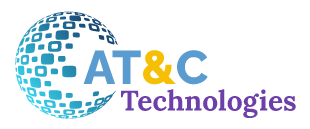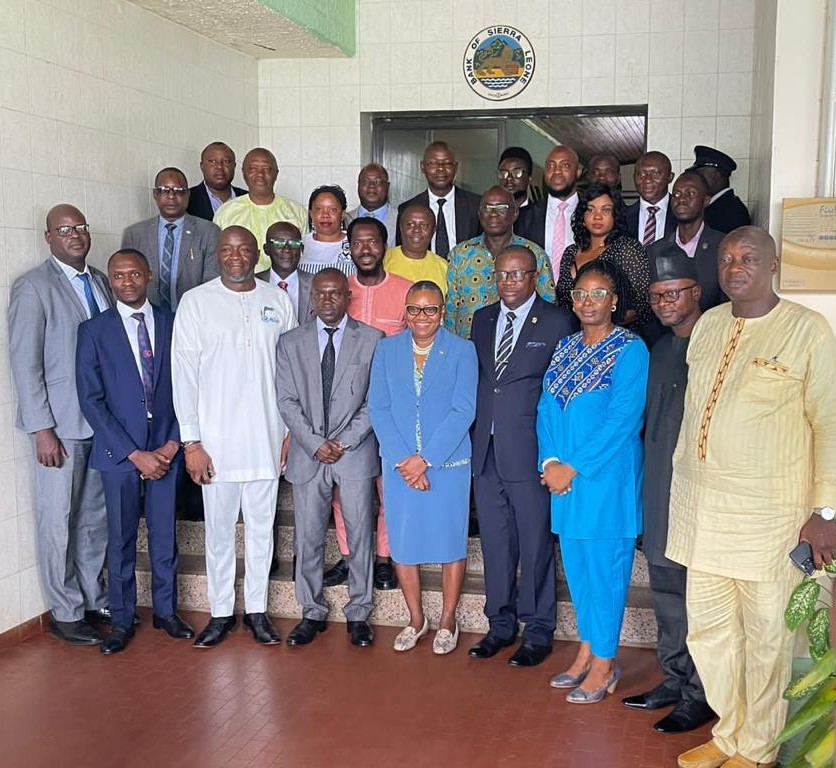
The Financial Intelligence Unit has successfully spearheaded a two-day national validation workshop at the Bank of Sierra Leone Complex, Kingtom, Freetown.
With support from the Inter-Governmental Action Group Against Money Laundering in West Africa, the FIU embarked on the update of the second ML/TF risk assessment exercise in July, 2022. The exercise took onboard new areas deemed to be prone to ML/TF risks in addition to the deficiencies identified in the Mutual Evaluation Report, in 2020. Sectors like Virtual Assets and Virtual Assets Service Providers, Legal Persons and Legal Arrangements, Not for Profit Organizations, Environmental Crimes and some sub-sectors in the Designated Non Financial Businesses and Professions like Car dealers, Shipping Companies, are given serious concern in this exercise.
Representatives from various AML/CFT Competent Authorities converged for the two days and deliberated the report sector by sector.
Gaps were identified, recommendations proffered and further mitigation measures assigned to the implementation plans.
The national risk assessment exercise is the first recommendation from the Financial Action Task Force to every member jurisdiction in the first against Money Laundering and Terrorist Financing.
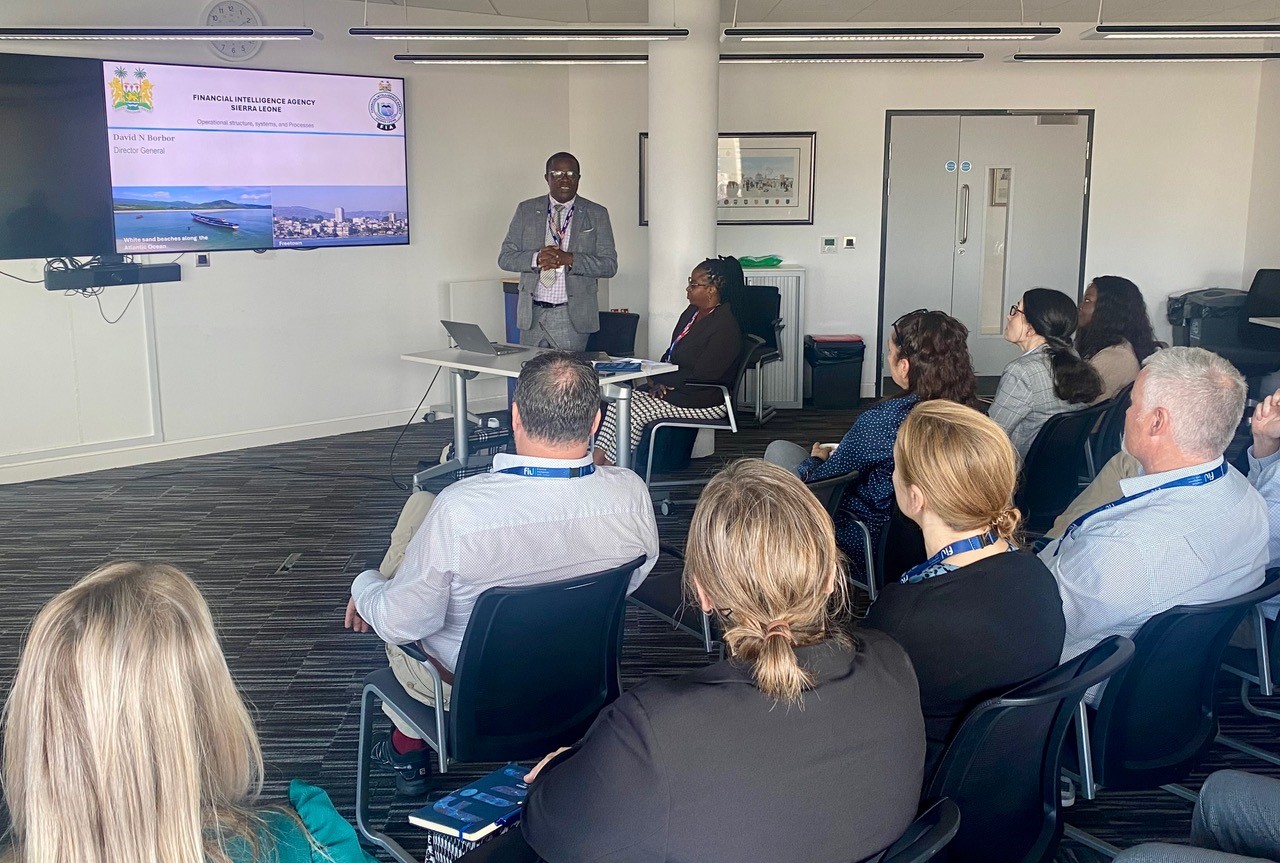
Director General of FIA Sierra Leone presenting to the Republic of Jersey FIU team
9 October 2024
PRESS RELEASE
Government of Jersey and Financial Intelligence Unit Jersey (FIU) welcome Sierra Leone FIA.
In the spirit of collaboration and partnership, FIU-Jersey and the Government of Jersey (GoJ) have hosted the Director General and Deputy Director General of the Sierra Leone Financial Intelligence Agency (FIA) to Jersey on a study visit and mentoring programme. The delegation will focus on engaging with public authorities involved in anti-money laundering (AML), countering the financing of Terrorism (CFT), and counter-proliferation financing (CPF).
Jersey is a member of the Egmont Group of FIUs and Sierra Leone a Candidate member of the Group. The Egmont Group is the global intelligence collective focused on financial crime. Sierra Leone and Jersey have organised the first ever Egmont Group sponsored study visit to share ideas, best practice and common challenges as FIU Jersey transforms and FIA Sierra Leone develops. The trip was generously funded by the Egmont Centre of Excellence and Leadership (ECOFEL).
The visit aims to align to Egmont strategic goals which includes:
- Enhance the framework for effective information exchange between FIUs and strengthen cooperation with international partner organisations.
- Develop and promote knowledge on new or emerging AML/CFT methods and trends, good practices, and Egmont Group requirements.
- Enhance support to Group members and candidate FIUs
During their visit, Sierra Leone FIA Director David Borbor and Deputy Director Kadijatu Juma-Sei will discuss best practices with Ian McDonald, Associate Director of GoJ Financial Crime Strategy team and Jonathan Groom, Director FIU Jersey. The focus is interconnections in our joint efforts to tackle the global fight against financial crime, both from an African and International Financial Centre (IFC) perspective and hear about the work undertaken on the recent FATF MONEYVAL assessment of the island. There will also be discussion on common financial crime risk areas, particularly the issue of high-level corruption and the removal of the proceeds of corruption from developing countries.
They will also attend a special meeting of the Jersey Financial Intelligence Network (JFIN – Jersey’s Public Private Partnership (PPP)) to discuss best practices concerning risks related to emerging payment methods, seen across African countries to understand cultural differences and typologies in the region regarding financial crime.
During their visit, they will meet with other key figures from the island’s competent authorities, including the Government’s Financial Crime Strategy team, Attorney General, Chief of Police, Jersey Customs & Immigration Service and the Jersey Financial Services Commission.
Leadership Mentor for ECOFEL Mentorship programme Ian McDonald commented:
“We are delighted to welcome David and Kadijatu to Jersey. This trip has been a long time in the planning with all the various parties. Still, we view such collaboration as essential to fostering the exchange of ideas and experiences and strengthening our global partnerships in the fight against financial crime.”
FIU Jersey Director Jonathan Groom commented:
“In the ethos of collaboration and partnership, this type of Executive Mentorship Programme, as well as discussing threat focuses and wider information sharing, is crucial to combating financial crime, and helps build a future FIU that considers global threats and crossovers.”
David Bobor from Sierra Leone commented:
“We thank ECOFEL, the Government of Jersey, and our partners FIU-Jersey for their support and for making this visit possible. While we have engaged virtually and met briefly at Egmont Group meetings over the last few years, it is invaluable to travel to Jersey to witness how a different jurisdiction tackles similar issues in the fight against financial crime. We welcome the opportunity to understand first-hand the transformation that FIU-Jersey is undergoing under Jonathan’s leadership.”
During the visit to FIU-Jersey, Jonathan presented David and Kadijatu with a commemorative crystal plaque to mark the visit to the Island and the continued collaboration and partnership between the two agencies. (see photos included).
- Ends –
Notes to Editors
For further information, please contact FIU Communications on +44 1534 612676 or fiu.comms@jersey.police.je
Supplied photos:
People in the photos include:
- David Borbor – Director Sierra Leone Financial Intelligence Agency
- Kadijatu Juma-Sei – Deputy Director Sierra Leone Financial Intelligence Agency
- Jonathan Groom – Director Financial Intelligence Unit Jersey
The essence of the meeting was to discuss the followings:
- To communicate what the Unit is currently doing and the challenges facing the FIU to combat Money Laundering and Terrorist Financing in Sierra Leone.
- To solicit support from the Embassy in providing technical assistance to the Unit especially in the area of ICT.
- To help in providing capacity building for operational staff of the Unit
After Listening to the U.S Embassy representative on reason for visit.
Director FIU appreciates U.S support in training and U.S Treasury Technical Assistance, Christine Wandra, Jeff Cooper and others.
The Director highlighted the following Challenges:
SUPPORT FIU FUNCTIONING THAT IS CONSISTENT WITH INTERNATIONAL STANDARDS AND BEST PRACTICES.
- The functioning of the FIU needs to be improved so that it can meet performance standards for core functions. A key objective of this project component in 2020 will be to assist FIU management and staff to understand and perform its core functions while off-loading responsibilities to the appropriate stakeholders to ensure duties are being shared across the AML/CFT regime. FIU hopes to actively relinquish control where appropriate and possible.
- Support FIU functioning that is consistent with international standards and best practices. Assist FIU management to continue identification of non-core functions with the goal of “freeing up” resources necessary to improve effectiveness and efficiency. Out of necessity the FIU has amassed a breadth of AML/CFT responsibilities outside of conventional core functions, which demand increased attention and resources. It is crucial for other appropriate stakeholders to begin “shouldering” some AML/CFT responsibilities, but incumbent on the FIU to ensure non-core work functions are performed as means of knowledge transfer.
- Support money laundering case development and asset forfeiture proceedings that are consistent with international standards and best practices.
FIU MANAGEMENT DEVELOPMENT:
- Some of the activities are intended to Continue supporting FIU management in understanding and clearly promoting their analytic and intelligence mandates as appropriate to the FIU’s core mission.
- Further develop already existing Standard Operating Procedures (SOPs) into a comprehensive document with the goal:
- To create a “record” of risks & implemented controls.
- Maintenance of SOPs enveloped into an existing job function.
- Further develop project management “tools” and staff skills to promote a culture of accountability and a basis to measure/track progress on efforts.
FIU “IT” STRATEGY WE NEED THE US EMBASSY TO:
- Assist the FIU to develop processes and procedures designed to leverage fully the information collected via the IT templates created in 2019. Then we will be able to Develop routine reports – tactical and strategic – designed to alert the FIU to anomalous activity not otherwise reported (i.e., spontaneous reporting) and to measure shifts in risks, to include geography (TF) and FI underreporting of STRs.
- Develop robust methods of prioritizing technology objectives and solutions the ensure Short-term goals (i.e., immediate or time-sensitive improvements) that provide “lift” but also set the stage to comprehensively address long-term needs. Interim solutions are in support of the goal to shift FIU resources from “undifferentiated heavy lifting” to sustainable value-added work products consistent with core mandates
FIU / BSL COLLABORATION and INTEROPERABILITY:
- The FIU will continue to support the Bank of Sierra Leone (BSL) to strengthen and maximize their role as bank examiner with respect to AML/CFT. Wide-ranging collaboration has been achieved through the execution and operationalization of an MOU which is now being reviewed by lawyers from both institutions.
- The planned re-execution of the MOU will appropriately address this goal.
- Established procedures and scheduled have been developed and are being followed.
DNFBP SECTOR DEVELOPMENT:
- Support the FIU with efforts designed to compel simultaneously, DNFBP governing agencies to recognize and assume their rightful AML/CFT supervisory responsibilities while at the same time bringing awareness to the DNFBP sectors through outreach and education. DNFBP Pilot Group created and holding regular meetings. Consultative workshop to roll out guidelines and “Rollout” compliance template created. Policy team has created a draft guidelines and template approved by all Supervisory bodies.
The Financial Intelligence Unit (FIU) with support from GIABA and World Bank on Tuesday commenced a three day national Money Laundering and Terrorism Financial Risk Assessment workshop at the Hill Valley Hotel in Freetown. The aim of the assessment is to lead to the determination of cost effective and proportionate ant-money laundering program of work, which prioritizes those areas of highest risk for management.
Director of FIU, Ahmed Kamara, said the exercise is designed to be country owned and country driven. The exercise has been structured in accordance with the World Bank National Risk Assessment (NRA) tool but that is not to say that we cannot modify it to reflect our peculiar circumstances. He said eight Working Groups have been set up to examine the risks and drivers of Money Laundering (ML) and Terrorism Financing (TF) in the following sectors: Crime Proceeds (SLP); National Vulnerability (ONS); Banking Sector (BSL); other Financial Institutions (NRA); Insurance Sector (SLICOM); DNFBPs (SPU); Securities (SEC) and Financial Inclusion (BSL). Mr. Kamara said these group leaders and their group members come to this process with an impeachable pedigree from their different works of life and what these groups will be doing in the next nine months is to collect, input, analyze and compile data; make presentations and compile reports.
Commissioner of the Anti- Corruption Commission (ACC) Joseph Fitzgerald Kamara said the NRA is a government-wide exercise that seeks to enhance and deepen our collective understanding of money laundering in the country. He added that a National Risk Assessment evaluates the nature and extent of a country’s exposure to potential external and internal risks. Mr. Kamara reiterated that “the ease with which money and valuables can now move across borders means that regulatory authorities and enforcement agencies within and among countries must cooperate and coordinate to address emerging risks”. The Commissioner said that Africa stands at a crossroads. Economic growth has taken root across much of the region. Exports are booming, foreign investment is on the rise and dependence on aid is declining. Governance reforms are transforming the political landscape. Democracy, transparency and accountability have given Africa’s citizens a greater voice in decisions that affect their lives.
Country Director, World Bank, Ato Brown, noted that in 2012, the international standards for anti- money laundering and the countering of the financing of terrorism were slightly revised and a new requirement was added requiring all countries to undertake a National AML/CFT Risk Assessment. He said this new requirement is to ensure that AML/CFT System will be designed in a way that ensures scarce resources will be aimed at mitigating the most serious risks, threats and vulnerabilities facing the country.
Mr. Brown said all countries are now trying to meet the new international obligation, so Sierra Leone is a trail blazer in undertaking this work, as only a handful of countries have begun.
GIABA Director of Research and Planning, Mu’aza Umar said the World Bank conducted the AML/CFT Assessment of Sierra Leone and the Detailed Assessment Report was adopted by GIABA in June 2007. He said the Report revealed the status of AML/CFT of the country as that period. Since then a lot progress has been recorded by the country in all areas-legislation, regulation, enforcement, compliance by reporting entities and greater international cooperation. Mr. Umar said the Assessment will identify ML/TF mechanisms , methods and techniques used by criminals, individuals and groups, and their associates in the country; determine or estimate the extent to which criminals employ the identified mechanisms, methods and techniques to launder the proceeds of crime through financial gateways, including the informal sector; assess the general political and socio-economic factors of the country that could facilitate ML/TF or hinder effective implementation of AML/CFT measures and to assess and determine the general sectoral ML/TF risks in the financial and designated non-financial sectors.
In his keynote address, Deputy Minister of Justice, Arrow John Bockarie, reiterated that “the menaces of money laundering and terrorism financing can no doubt lead to the breakdown of the orderliness of legitimate businesses, interfere with economic and other state policies, distort market conditions and ultimately create serious systemic risk. Where financial institutions are involved in or tolerate money laundering, the result is often distress and collapse,” the Deputy Minister maintained, adding “as a government, we regard the National Risk Assessment as a critical ingredient to strengthening the country’s AML/CFT regime. The National Risk Assessment is a direct response to Recommendation 1 of the Financial Action Task Force (FATF) revised standards”. The Minister assured of government’s commitment to the fight against money laundering and terrorism financing, noting that they are menaces that affect not only the domestic economy but have far- reaching consequences for the region and the global economy if left unchecked. “As a responsible nation within the global community, we feel beholden to join the rest of the world in the fight against these twin evils,” Minister Bockarie committed. He said as a demonstration of government’s firm commitment to the fight against the two financial menaces, it passed the AML/CFT Act 2012 into law, established the Financial Intelligence Unit as an autonomous institution to coordinate the country’s efforts in the rollout of international standards across all sectors.
Freetown – His Excellency Dr Ernest Bai Koroma has assured the Director General of the Inter-Governmental Action Group against Money Laundering in West Africa (GIABA), Dr Abdullahi Shehu that Sierra Leone is fully committed to the goals and aspirations of the group as a specialized body of ECOWAS.
He made this declaration during a courtesy call on him on Wednesday 23rd January at State House, by the GIABA delegation led by its indomitable Director General, Dr Abdullahi Shehu.
Responding to concerns raised by the GIABA delegation, President Koroma said that the Director General does not need six hours to convince him about setting up of the Financial Intelligence Unit (FIU) in Sierra Leone, like he did with the Guinean Finance Minister; owing to the fact that the Governor of the Bank of Sierra Leone had already laid the foundation for the establishment of the FIU.
“You do not need to preach to the converted as the Anti-Money Laundering Act was passed by parliament in February and received Presidential Assent in the same February of 2012. The speedy endorsement of the law is a clear manifestation of the seriousness government attaches to the fight against money laundering and terrorism financing in Sierra Leone. Before the end of this month (January) we will appoint a director that will be working alongside the governor in the unit”, he assured.
The President also noted that the ratification of the convention on Money Laundering as well as the UN convention on Terrorism will be looked into by the current House of Parliament, and that the visit of the GIABA Director General will further consolidate the supervision of the process saying that; “the unit will soon be established in Sierra Leone and that the necessary equipment will be put in place to ensure its full operation”.
The Director General of GIABA Dr Abdullahi Shehu while congratulating President Koroma on his resounding re-election, observed that the victory was an indication of confidence demonstrated in his leadership by the people.
Dr Shehu however encouraged President Koroma to continue to steer the mantle of leadership of the country, and further praised him for the strong support he has given to the region.
GIABA Director General informed President Koroma that the project requires high level of commitment particularly in the area of the establishment of the FIU, which is an international requirement that had long been misunderstood, adding that it took him six hours to explain to the Guinean Minister of Finance about the importance of the unit.
“We have a comprehensive budget to support the project with software and by the time it is ready the law enforcement aspect will be playing an active role in the whole process”, he said, while also maintaining that the unit is the only organ that is related with other law enforcement agencies like Interpol. He therefore implored President Koroma for the provision of the necessary infrastructure to make the project successful.
He however reiterated the importance of the unit, saying that it will give confidence to the investment and business communities within member states; a reason why the delegation was in Sierra Leone asking for his fatherly intervention.
“We want to take the advantage to see that things actually move in the positive direction”, he reassured President Koroma.
GIABA is a specialized institution established by the Authority of Heads of State and Government of ECOWAS in 2000 to develop strategies for the prevention and control of transnational crime, especially money laundering and terrorism financing in member states.
A major responsibility of GIABA is to help member states undertake self-evaluation and mutual evaluation to ascertain their level of compliance with acceptable international standards against money laundering and the prevention of the financing of terrorism, particularly the Financial Action Task Force (FATF)-forty recommendations.
The organization also grants observer status to African and non-African states as well as Inter-Governmental Organizations that support its objectives and actions which have applied for such status.
- 1
- 2







